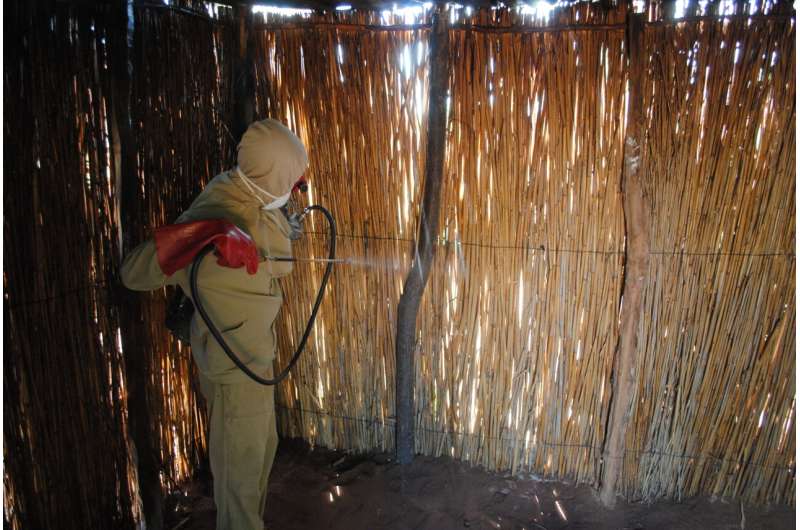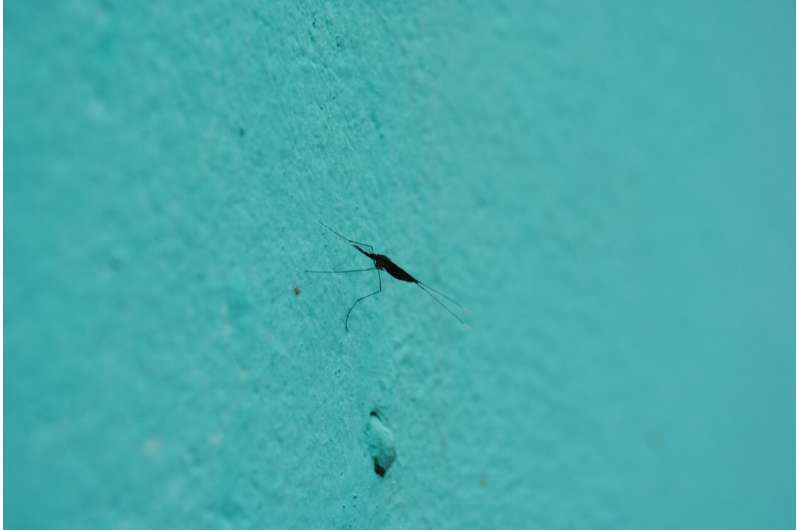This article has been reviewed according to Science X's editorial process and policies. Editors have highlighted the following attributes while ensuring the content's credibility:
fact-checked
peer-reviewed publication
trusted source
proofread
New publication unravels the impact of the widespread use of insecticides for malaria control

Several diseases are caused by viruses, bacteria, or even parasites. Sometimes, these microorganisms cannot infect humans (or other animals) by themselves, so they rely on other organisms—called vectors—to carry them around and transmit the disease from one host to another.
A well-known group of vectors is arthropods. Arthropods have a hard exoskeleton, segmented bodies, and jointed legs. They are incredibly diverse and can be found in various habitats worldwide. They include disease-carrying vectors such as mosquitoes, sand flies, kissing bugs, and ticks.
Mosquitoes spread diseases like malaria, dengue, Zika, and yellow fever. Over the last century, people have developed various ways to reduce mosquito numbers to avoid spreading life-threatening diseases, mainly malaria. The most common approach is using insecticides added to bed nets or sprayed indoors. Although these tools target mosquitoes, they often affect other types of arthropods that might come in contact with them.
Graduate student Ndey Bassin Jobe, Assistant Professor Silvie Huijben, and Assistant Professor Krijn Paaijmans from the School of Life Sciences and the Center for Evolution and Medicine recently published a personal view on this topic in The Lancet Planetary Health journal. In their publication, they discuss how insecticides used in malaria control not only affect malaria-carrying mosquitoes but can also lead to insecticide resistance in other arthropods, several of which transmit overlooked and dangerous tropical diseases.
How these arthropods behave, like when and where they feed and rest, affects how widely they are exposed to insecticides used for malaria control. Jobe and colleagues argue that there is an urgent need to monitor the behavior and insecticide susceptibility status of those other arthropods.

When other arthropods are repeatedly exposed to the same insecticides, they might become resistant to the chemicals meant to kill or control malaria mosquitoes. "Understanding the extent to which other disease vectors are exposed to insecticides used now is critical because if they already develop resistance, it will be difficult to prevent and control future emerging and re-emerging diseases," Ndey Bassin explains.
Unfortunately, many other arthropod species are already resistant to insecticides used in malaria vector control. Scientists still don't know much about when, where, and how often they come into contact with malaria control tools. Understanding how these organisms become resistant is crucial to ensure insecticides can effectively control and prevent various diseases now and in the future.
"Effectively combating vector-borne diseases depends very often on the control of arthropod vectors as for many diseases, including West Nile virus, Zika, chikungunya, Saint Louis encephalitis and Ross River virus, we do not have vaccines or drugs," Professor Paaijmans said.

The authors emphasize an urgent need for a comprehensive approach to managing disease-carrying organisms. Understanding behavioral patterns and the overall characteristics of other organisms that can spread disease is critical to preventing and controlling future health threats.
"We have to improve our understanding of the distribution, ecology, behavior and insecticide susceptibility status of all other relevant arthropod species, to ensure we develop the most future-proof and holistic vector control strategies and protect future generations," Professor Huijben concluded.
More information: Non-target effects of chemical malaria vector control on other biological and mechanical infectious disease vectors, The Lancet Planetary Health (2023). DOI: 10.1016/S2542-5196(23)00136-5 , www.thelancet.com/journals/lan … (23)00136-5/fulltext




















